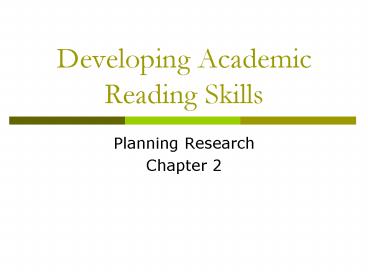Developing Academic Reading Skills - PowerPoint PPT Presentation
1 / 15
Title:
Developing Academic Reading Skills
Description:
Developing Academic Reading Skills Planning Research Chapter 2 Why Academic Reading? Reading is the most critical part of the learning process. Reading often appears ... – PowerPoint PPT presentation
Number of Views:121
Avg rating:3.0/5.0
Title: Developing Academic Reading Skills
1
Developing Academic Reading Skills
- Planning Research
- Chapter 2
2
Why Academic Reading?
- Reading is the most critical part of the learning
process. - Reading often appears to students to be the most
boring of all tasks - BUT
- Your ideas about research will come mainly from
reading - Wide reading expands your perspectives
3
Selective Reading
- It is unrealistic to expect that you can read
everything! - You therefore have to read selectively
- Criteria for selection might be
- Learning outcomes of module
- Your research question
- Overall purpose of the assignment
4
Is it worth reading this Paper?
- Examine these three parts of the paper / project
or article - The abstract
- Dealing with the topic, results and findings
- The introduction
- Lining up the research
- Where are the gaps?
- The conclusion
- Trying to convince the reader that this is worth
reading!
5
Reading the PaperAbstract
- Approach to the investigation of the topic
- Will report on what was discovered during the
work - Analysis, discussion or results in short
- What is new about the work?
6
Reading the PaperIntroduction
- This is where the authors make a promise
- Like a contract between authors and the reader
- Identifying relevant research gaps
- At least some of them will be filled out!
7
Reading the PaperThe Context of the Research
- Reading the background section will give you a
better grasp of the situation that gave rise to
the research - The real world location into which the research
problem might fit
8
Reading the PaperThe Litterature Review
- If you were an architct and we asked you to build
a house in an earthquake zone, you would make
sure that the foundations were strong and solid - This is how authors think of their dissertations
and academic papers - Not just a description of others previous work,
but the litterature review - Appraises, compares and contrasts it with each
other and relevant work
9
Reading the PaperResearch Design
- Discusses how the research was carried out
often called methodology or research design - Research Strategy case study, survey,
observations - Research Methods
- Why these methods?
- Population, the sample, data collection,
interpretation, analysis
10
Reading the PaperFindings
- Do the findings confirm the litterature?
- Do the findings dis-confirm the litterature?
- Do the findings go further than the litterature?
- There is no single manner or method of
presentation of research findings
11
Reading the PaperConclusion
- The authors do not try to reinvent the wheel
but - To deliver the promise given in the introduction
section - Make a minor contribution to the body of
knowledge on the subject - Should be MORE than a summary, namely
synthesizing the overall arguments presented in
the paper, and - Highlight meanings
- Emphasize contributions
12
Extracting Value from your Reading
- Finding the Claim
- What question does the author pose?
- What is the primary argument?
- Why is this argument significant?
13
Validity of the arguments?
- 1. Evidence
- What evidence do the authors offer in support of
their position? - How convincing is the evidence
- 2. Counter-arguments
- What arguments are made in opposition?
- What evidence was used in the refutation
- 3. Effectiveness
- What were the strength of the article?
- Did you get a clear picture?
14
SQ3R Academic Reading Technique
- Survey, Question, Read, Record, Review
- 1. Survey (one minute)
- Scan title, headings, figures and conclusion
- 2. Question (30 seconds)
- What is the research question?
- 3. Read (takes some time)
- Trying to find the answer to the question in each
heading
15
SQ3R Academic Reading Technique
- 4. Record (no more than five minutes)
- Make a few notes, use highlighter, write in the
margin - 5. Review (no more than five minutes)
- Test yourself by trying to recall some of the
highlighted phrases - How does these points fit with what you already
think or know?































